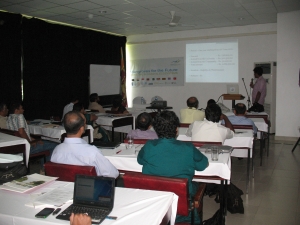Sri Lanka shares lessons learned from small grants coastal projects
Location: Colombo, Sri Lanka . 7th May 2013
The Small Grant Facility grantees, whose projects commenced January 2012 and will conclude in July 2013, gathered at the Sri Lanka Foundation Institute and discussed key learning from projects implemented in four coastal priority areas in Sri Lanka, namely: Kokilai, Batticaloa, Panama- Pottuvil and Puttalam lagoon.
A key lesson learned was about the importance of partnership and collaboration for project sustainability. This is demonstrated by the Ecological Association of Sri Lanka's project, "Seasonal and spatial variation of physico-chemical parameters of water in the Panama lagoon", which studied the Panama Coastal Wetland through scientific lagoon assessments. In one of the monitoring visits to the project, a member of the NCB noted that sediment analysis can greatly enhance the study. In Panama lagoon, sedimentation is a coastal management concern; a sediment analysis can inform management interventions.
Taking this suggestion, the Ecological Association of Sri Lanka, through Prof. Rohana Chandrajith, contacted the Linköping University of Sweden and expressed interest for collaboration on this special research. The Swedish University agreed. Funding is through Swedish Research Council under the Swedish Research Links programm . Panama is also one of the University's priority study areas in carrying out research about paleoclimatic change in the east coast of Sri Lanka. The research findings will be useful to management in the lagoon. The project grantee shared that this research collaboration proves that small grant project interventions can continue after MFF grant funding.
Another key lesson was about how re-introducing traditional fishing gear was able to contribute to a sustainable livelihood approach in Kokilai lagoon. The Sewalanka Foundation's project, "Introducing and encouraging use traditional fishing gear for Mud Crab Fishery in Kokilai Lagoon", demonstrated how the use of traditional traps have reduced wastage of fishery resources, or by-catch. Selective harvest using the traps enables the fishermen to throw underweight or egg-bearing crabs back to the lagoon. Read a similar story.
The National Coordinating Body (NCB) of MFF Sri Lanka attended the lessons sharing event. Projects were grouped and presented under three thematic sessions: Knowledge/Research; Ecosystem restoration; and Livelihoods enhancement. Each session was chaired by a member of the NCB.
For more information, please contact:
Mrs Kumudini EkaratneNational Coordinator, MFF Sri Lanka
gro.ncui@entarake.inidimuk :liamE

Sharing lessons from a SGF project, Colombo © IUCN/Kumudini Ekaratne, 2013